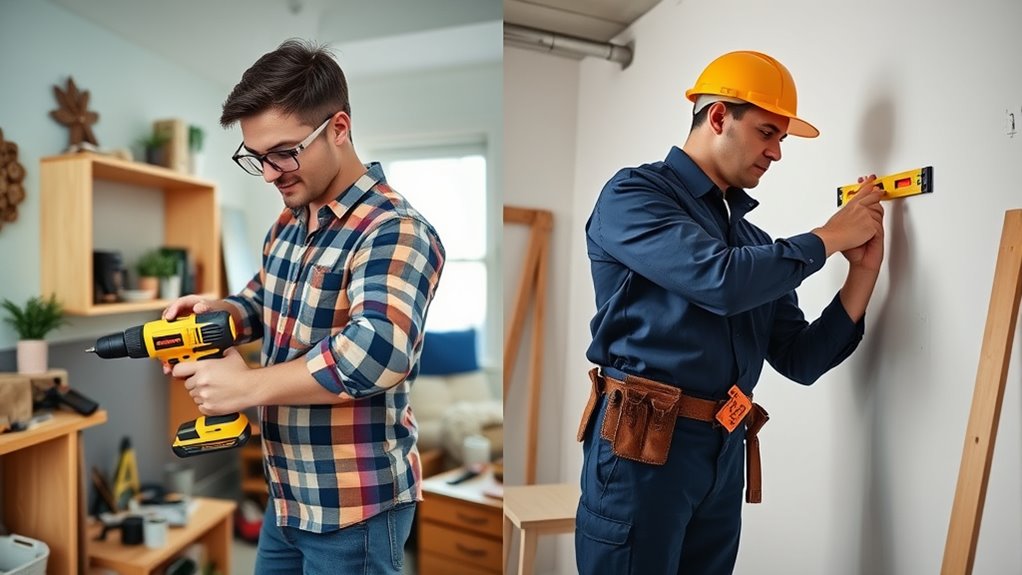When deciding between DIY and hiring a pro for home repairs, consider your skill level, project complexity, and budget. Simple fixes or small tasks are often okay to do yourself, especially if you’re confident and want to save money. However, for large, delicate, or safety-critical projects, it’s best to hire a professional who guarantees quality and compliance. To discover more about making the right choice for your home, keep exploring your options.
Key Takeaways
- Consider hiring a professional for complex or large-scale projects to ensure safety, quality, and code compliance.
- Opt for DIY if you have the necessary skills, experience, and confidence to minimize risks and costs.
- Use professional services when project deadlines are tight or if you want a durable, long-lasting result.
- Weigh the costs: DIY can save money but may lead to costly mistakes requiring repairs.
- Choose professionals for safety-critical tasks or when the project involves intricate or delicate work.

Are you weighing the options between tackling a home improvement project yourself or hiring a professional? Many homeowners face this decision, often leaning towards DIY to save money. In fact, 73% of people choose to handle projects on their own mainly because they want to cut costs. You might feel confident in your skills or believe the project isn’t complicated enough to justify paying someone else. DIY projects can range from simple repairs to more complex renovations, which appeals to those enthusiastic to learn new skills or take on a challenge. Plus, most DIYers finish their projects within a month, making it a quick solution for many.
However, it’s important to recognize the risks involved. Nearly 42% of DIY projects end in regret, often because the results aren’t up to standard or because costs spiraled beyond expectations. Sometimes, mistakes happen, and over 20% of DIY efforts require professional help afterward to fix errors. Limited experience or access to the right tools can lead to subpar outcomes, costing you time and money in the long run. If you lack expertise or the project involves complex tasks, the chances of errors increase. Additionally, DIY projects can be stressful—56% of Americans report feeling overwhelmed, especially if they’re balancing other responsibilities or have high expectations.
On the other hand, hiring a professional offers clear advantages. Experts bring specialized knowledge and skills that ensure high-quality results, especially for large or intricate projects. They work more efficiently, often completing jobs faster than a DIY effort, saving you time and reducing disruption. Many professionals also provide warranties and ongoing support, giving you peace of mind if issues arise later. When you’re dealing with big-scale or complex tasks, professionals are better equipped to handle the scope without compromising quality. Furthermore, choosing professional services can help ensure that your project complies with local building codes and safety standards, which is crucial for long-term safety and adherence to regulations.
Yet, professionals aren’t without their challenges. Cost is the most obvious concern, as hiring someone typically involves higher expenses for labor and materials. Trust can also be an issue; finding reliable professionals requires research and good judgment, as poor communication or work quality can lead to dissatisfaction. Despite these hurdles, many homeowners find that the benefits of professional work outweigh the drawbacks, especially when it comes to ensuring the longevity and safety of their home.
Ultimately, weighing these factors depends on your budget, confidence, and the complexity of the project. If you’re comfortable with the risks, have the time, and want to save money, DIY might be right for you. But for bigger or more delicate jobs, hiring a professional can save you headaches and deliver a better outcome in the long run.
Frequently Asked Questions
How Do I Identify if a Repair Is Too Complex for DIY?
You need to assess if a repair is too complex for DIY by looking at safety risks, technical requirements, and tools needed. If it involves structural issues, electrical or plumbing work, or hazardous materials like lead or asbestos, it’s best to call a professional. Also, consider if specialized equipment, knowledge, or code compliance is essential. When in doubt, consulting a pro can prevent costly mistakes and ensure safety.
What Safety Precautions Should I Take When Attempting DIY Home Repairs?
When doing DIY home repairs, prioritize safety by wearing the right PPE, like safety goggles, gloves, and sturdy footwear. Always inspect tools before use, keep your workspace clean and well-lit, and avoid working in wet or slippery conditions. Take regular breaks to prevent fatigue, and never operate tools while under the influence. Following these precautions helps minimize risks and keeps you safe throughout your project.
How Much Money Can I Save by Doing Repairs Myself?
You can save a significant amount of money by doing repairs yourself, often around $2,700 compared to $8,100 if you hire a professional. Labor costs are the biggest factor, sometimes exceeding materials. For simple fixes like fixing a door or changing filters, your savings can be hundreds or thousands of dollars. However, consider potential errors and time investment, as mistakes can end up costing more than hiring a pro.
When Is It Necessary to Obtain Permits for Home Repairs?
You need to get permits when your home repairs involve structural changes, electrical work, plumbing upgrades, or major renovations. For example, adding rooms, replacing siding, or installing new electrical systems all require permits. Failing to obtain them can lead to fines, delays, or legal issues. Always check with your local building department or consult professionals to determine the specific permits needed for your project to stay compliant and safe.
How Do I Find a Qualified Professional for Specific Home Projects?
Finding a qualified professional is like hunting for a needle in a haystack, but with the right approach, you can hit the jackpot. Start by checking their licenses and insurance, then read reviews and ask for references. Don’t forget to ask friends, family, or real estate agents for recommendations. Conduct interviews, compare quotes, and review past work to guarantee they’re the perfect fit for your specific project.
Conclusion
Knowing when to tackle a project yourself or call in a pro is like choosing between a DIY toolkit and a safety net. While some repairs are simple enough to handle on your own, others can turn into a quagmire if you’re not careful. Trust your judgment—sometimes, hiring a pro is the anchor that keeps your home from sinking into chaos. After all, a wise homeowner knows when to roll up their sleeves and when to call for backup.










